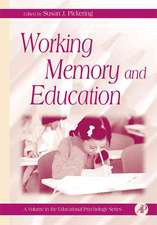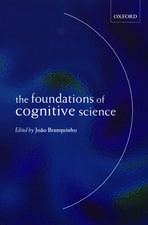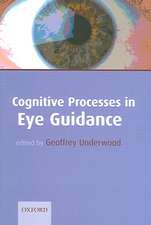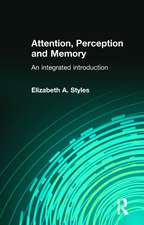Understanding Emotions in Mathematical Thinking and Learning
Editat de Ulises Xolocotzinen Limba Engleză Hardback – 15 mai 2017
- Covers methodologies in studying emotion in mathematical knowledge
- Reflects the diverse and innovative nature of the methodological approaches and theoretical frameworks proposed by current investigations of emotions and mathematical cognition
- Includes perspectives from cognitive experimental psychology, neuroscience, and from sociocultural, semiotic, and discursive approaches
- Explores the role of anxiety in mathematical learning
- Synthesizes unifies the work of multiple sub-disciplines in one place
Preț: 385.63 lei
Preț vechi: 490.61 lei
-21% Nou
Puncte Express: 578
Preț estimativ în valută:
73.79€ • 78.91$ • 61.52£
73.79€ • 78.91$ • 61.52£
Carte tipărită la comandă
Livrare economică 10-24 aprilie
Preluare comenzi: 021 569.72.76
Specificații
ISBN-13: 9780128022184
ISBN-10: 0128022183
Pagini: 474
Dimensiuni: 152 x 229 x 29 mm
Greutate: 0.91 kg
Editura: ELSEVIER SCIENCE
ISBN-10: 0128022183
Pagini: 474
Dimensiuni: 152 x 229 x 29 mm
Greutate: 0.91 kg
Editura: ELSEVIER SCIENCE
Cuprins
PART I INTRODUCTION: AN OVERVIEW OF THE FIELD
1. An Overview of the Growth and Trends of Current Research on Emotions and Mathematics
2. Appraising Emotion in Mathematical Knowledge: Reflections on Methodology
PART II COGNITION AND EMOTION IN MATHEMATICAL ACTIVITY
3. Being in Control
4. Epistemic States of Convincement: A Conceptualization from the Practice of Mathematicians and Neurobiology
5. The Impact of Anxiety and Working Memory on Algebraic Reasoning
PART III EMOTIONS IN THE LEARNING AND TEACHNING OF MATHEMATICS
PART IIIA LEARNERS IN DIFFERENT EDUCATIONAL LEVELS
6. Students’ Emotional Experiences Learning Mathematics in Canadian Schools
7. "I did Use to Like Maths…": Emotional Changes Towards Mathematics During Secondary School Education
8. When Being Good at Math Is Not Enough: How Students’ Beliefs About the Nature of Mathematics Impact Decisions to Pursue Optional Math Education
PART IIIB LEARNERS WITH MATHEMATICAL DIFFICULTIES
9. Special Needs in Mathematics Classrooms: Relationships with Others
10. The Construct Mathematical Resilience
PART IIIC LEARNERS OUT OF THE SCHOOL
11. The Emotions Experienced While Learning Mathematics at Home
12. Parents’ and Children’s Mathematics Anxiety
PART IIID MATHEMATICS TEACHERS
13. ‘I Hate Maths’: Changing Primary School Teachers’ Relationship with Mathematics
14. Using Students’ Emotional Experiences to Guide Task Design in Mathematics Content Courses
PART IV THEORETICAL ADVANCES
15. Digging Beneath Dual Systems Theory and the Bicameral Brain: Abductions About the Human Psyche from Experience in Mathematical Problem Solving
16. On the Irreducibility of Acting, Emoting, and Thinking: A Societal-Historical Approach to Affect in Mathematical Activity
17. Emotional Orientations and Somatic Markers: Expertise and Decision-Making in the Mathematics Classroom
1. An Overview of the Growth and Trends of Current Research on Emotions and Mathematics
2. Appraising Emotion in Mathematical Knowledge: Reflections on Methodology
PART II COGNITION AND EMOTION IN MATHEMATICAL ACTIVITY
3. Being in Control
4. Epistemic States of Convincement: A Conceptualization from the Practice of Mathematicians and Neurobiology
5. The Impact of Anxiety and Working Memory on Algebraic Reasoning
PART III EMOTIONS IN THE LEARNING AND TEACHNING OF MATHEMATICS
PART IIIA LEARNERS IN DIFFERENT EDUCATIONAL LEVELS
6. Students’ Emotional Experiences Learning Mathematics in Canadian Schools
7. "I did Use to Like Maths…": Emotional Changes Towards Mathematics During Secondary School Education
8. When Being Good at Math Is Not Enough: How Students’ Beliefs About the Nature of Mathematics Impact Decisions to Pursue Optional Math Education
PART IIIB LEARNERS WITH MATHEMATICAL DIFFICULTIES
9. Special Needs in Mathematics Classrooms: Relationships with Others
10. The Construct Mathematical Resilience
PART IIIC LEARNERS OUT OF THE SCHOOL
11. The Emotions Experienced While Learning Mathematics at Home
12. Parents’ and Children’s Mathematics Anxiety
PART IIID MATHEMATICS TEACHERS
13. ‘I Hate Maths’: Changing Primary School Teachers’ Relationship with Mathematics
14. Using Students’ Emotional Experiences to Guide Task Design in Mathematics Content Courses
PART IV THEORETICAL ADVANCES
15. Digging Beneath Dual Systems Theory and the Bicameral Brain: Abductions About the Human Psyche from Experience in Mathematical Problem Solving
16. On the Irreducibility of Acting, Emoting, and Thinking: A Societal-Historical Approach to Affect in Mathematical Activity
17. Emotional Orientations and Somatic Markers: Expertise and Decision-Making in the Mathematics Classroom













